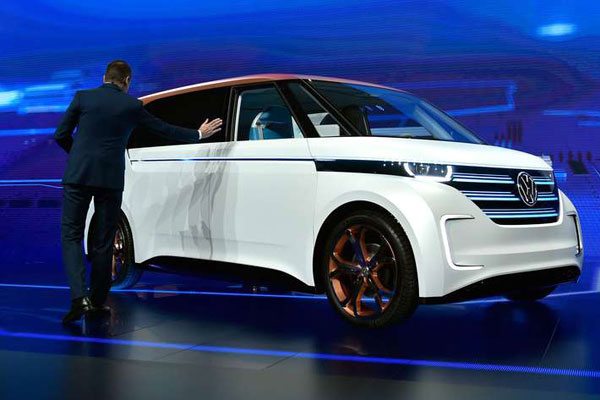Meet the revamped Volkswagen Kombi. Once a hippie favourite, the minivan has been transformed into an electric, connected vehicle of the future.
BUDD-e, unveiled late Tuesday in Las Vegas, is “a new concept for long-distance electric vehicles,” explained VW brand chief Herbert Diess on the eve of the official opening of the Consumer Electronics Show.
The electric minivan is rather modern but clearly a nod to that symbol of the hippie movement of the 60s and 70s — and idol of surfers and families — known as the Kombi or Bulli.
Volkswagen officially stopped production of the microbus about two years ago.
VERBAL COMMANDS
The new version is filled with technology that makes it “intelligent” and “social,” with a new electronic interface that is both intuitive and interactive.
“Door handles are so 2016,” Diess proclaimed, as he noted how the model responds to verbal commands or gestures.
BUDD-e can also communicate with connected devices at home.
So you can check from the comfort of your van if there’s enough beer left in the fridge before inviting friends over to watch a soccer match or to see who’s come knocking at your door to let them in or ward them off.
It’s also based on the future modular production platform for VW electric vehicles, with a more efficient battery that is located under the floor.
It charges up to 80 percent in just 30 minutes and can travel up to 373 miles (600 kilometers) on a full charge — equivalent to today’s average car running on a full tank.
Although it’s just a prototype for now, “BUDD-e could be a reality by the end of the decade,” Diess said.
‘SMARTPHONE ON WHEELS’
The auto group also presented a second electric prototype, the e-Golf touch, which is due to hit the market within a year, according to VW’s Volkmar Tanneberger.
He called it a “smartphone on wheels,” with verbal commands and gestures replacing buttons, which has a new generation of infotainment systems and is compatible with almost any smartphone, and can also be charged wirelessly.
You can also use a smartwatch to unlock the car, turn on the heat or air conditioning from a distance while the vehicle is still charging, or receiving notifications when someone else — say a teen — is driving the car and is driving too fast or exiting a predefined zone.
Although the firm was presenting electric vehicles at CES, Diess said Volkswagen was determined to resolve the scandal over pollution test cheating in its diesel cars.
The automaker is embroiled in a massive lawsuit filed by the US government after it was found to have installed software in 11 million engines worldwide that intentionally subverted clean-air regulations.
“The current issue with the diesel engine is certainly nothing to be proud of. We disappointed our customers and the American people, for which I’m truly sorry and for which I apologize,” Diess said.
“We are committed to make things right and we are focused on ensuring that something like this can never happen again at Volkswagen.”








